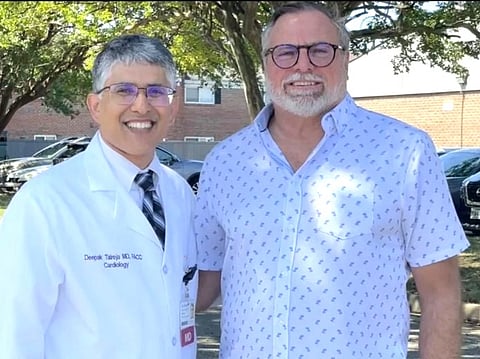Fate or luck? Driver survives heart attack after crashing outside cardiologist's office
Talreja administered CPR for over 8 minutes — a critical window — until paramedics arrived

Jeff Geraci, a 64-year-old Virginia Beach resident, never imagined that a routine drive home would turn into a brush with death. After finishing his workout at a gym, he felt a strange heaviness and decided to drive rather than rest. Soon, his chest tightened, and he lost consciousness behind the wheel.
His car veered across lanes, narrowly missing other vehicles, before it finally struck a business sign and came to rest in the parking lot of a nearby medical office. Remarkably, that office belonged to Dr. Deepak Talreja, the chief cardiologist for Sentara Health, whose door was just a few steps away.
Almost as if fate intervened, Dr. Talreja heard the crash, sprinted outside while dialing 911, and arrived to find Geraci unresponsive, with no pulse and not breathing. The windshield was shattered, airbags were deployed, and Geraci lay hidden under a tangle of deployed cushions.
Talreja immediately began CPR and continued doing so for more than eight minutes until paramedics arrived — a critical window in which brain damage or death becomes likely.
Geraci later learned that his 'widow maker' artery—the left anterior descending artery—was about 95 per cent blocked, with other blockages also present.
He awoke in the hospital to confusion, hearing that he had crashed his car after suffering a heart attack.
Geraci, who comes from a family with a history of heart disease, had considered himself relatively fit; he had run marathons and exercised regularly.
Now, he regards his survival as nothing short of miraculous — attributing it to a combination of fortune, divine protection, and the fast action of Dr. Talreja.
This extraordinary sequence — a massive heart attack, a car crash, and an immediate lifesaving response from the very cardiologist whose office he crashed in front of — underscores the thin line between disaster and survival.
Sign up for the Daily Briefing
Get the latest news and updates straight to your inbox





